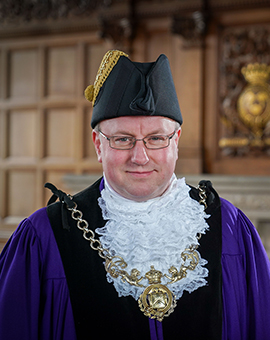The Sheriff of Chester
History – The Office of Sheriff of Chester
Prior to the 1835 Municipal Corporations Act, Chester’s government was in the hands of unpaid officials drawn from the local community. After 1835 paid officers began to be appointed, although several, such as the Mayor and Sheriff, continued to be unpaid.
It is thought that Chester was the first English town to have a Sheriff. The office is certainly much older than that of the Mayor. A Sheriff is first mentioned in a charter to the Abbey of St Werburgh in c1121-29. From an early date, Chester had two Sheriffs at a time. They were men of great importance and were responsible for many aspects of City government.
They had legal duties, such as the return of writs, assisted the Mayor in running the Portmote Court and presided over the Pentice Court and Passage Courts. The Portmote Court is first mentioned at the beginning of the 13th Century and registered land transactions, dealing with real estate, trespass, covenant and debt. By 1295 the Portmote Courts were held before the Sheriff but after 1300 the Mayor became more associated with them. The Portmote Court is documented up to 1720. The Pentice Courts dealt with matters of debt and trespass and cases which were not settled in the Pentice Court could be sent to the Passage Court.
Under the “Great Charter” of 1506 one of the Sheriffs was chosen by the Mayor, former Sheriffs and Aldermen and the other Sheriff was chosen by the citizens of Chester, presumably the Freemen who were the only people entitled to vote at that time. In the sixteenth and seventeenth centuries the Sheriffs seem to have found their duties onerous and in 1604, because of the growing complaints that the Sheriffs were failing to hold their courts, the Assembly insisted that they held their Pentice Court three times a week and the Passage Court once every five weeks.
The Sheriffs were also responsible for maintaining the City Gaol in the Northgate. After 1835, Chester elected only one Sheriff each year and this continues to the present day. Today the office of Sheriff is ceremonial. His/her only official responsibility is to move the sealing of documents at Council meetings and the annual inspection of the City plate. This latter duty has been performed since 1908 and is to check that all the City plate can be accounted for.
The Sheriff is also hosts jointly with the High Sheriff of Cheshire the annual Legal Service in Chester Cathedral for the judges on the local Circuit. The service is to mark the beginning of the Legal Year.
The Legal Service takes place in October at Chester Cathedral and is attended by the Presiding High Court Judges, Circuit Judges, District Judges, Recorders and Assistants, Magistrates and representatives of the Legal profession and Local Authorities. Also invited to attend and mark this beginning are: Chester Academic Leaders, neighbouring mayors and Town Mayors, Chief Officers from Cheshire Police and Fire Service, Hon Freeman and Alderman, ex Sheriffs of Chester and Civic Heads, current serving Cheshire West and Chester Councillors and representatives of local organisations.
Her Majesty the Queen, at her coronation, promised to serve her people and to ensure justice was delivered in the Kingdom. Following her example, once a year, for one hour, Her Majesty’s Judges and others attend Chester Cathedral and by so doing acknowledge a higher authority than themselves, one recognised by all faiths as a merciful Judge.
Duties
There are no other specific duties for a Sheriff but a typical year will include:
- The Sheriff’s Breakfast, a recent reintroduction in a modern format of this ancient tradition, originally an archery contest held on the Roodee. Today a full English breakfast precedes a guest author talking about their book. Any fund-raising proceeds from the event go to charities nominated by the Sheriff.
- Attending Civic Receptions at the Town Hall (but these being hosted by the Lord Mayor).
- At the Lord Mayor’s discretion, hosting fund raising events on behalf of the Lord Mayoral charities and occasional events as instigated by the Sheriff.
- Undertaking specific functions as invited.
- Deputising at certain functions for the Lord Mayor or Deputy Lord Mayor in their absence.
- Giving general support to the Lord Mayor as required.
Sheriff’s regalia
The Sheriff’s chain was presented by Alfred W Butt in memory of his father, Alderman Francis Butt, on the occasion of the opening of the Town Hall in 1869. The badge bears the arms known as the arms of the Sheriff, “a chevron between three garbs” and is surrounded by an earl’s coronet supported by a lion and a wolf.

